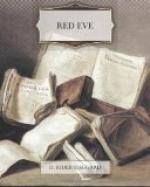Now he paused, but as Eve made no answer went on:
“Pity for your lot, yes, and my love for you that eats my heart out, caused me to seek your father’s leave to visit you and see if perchance I could not soften your wrath against me.”
Again he paused and again there was no answer.
“Moreover,” he added, “I have news for you which I fear you will think sad and which, believe me, I pray you, it pains me to give, though the man was my rival and my enemy. Hugh de Cressi, to whom you held yourself affianced, is dead.”
She quivered a little at the words, but still made no answer, for her will was very strong.
“I had the story,” he continued, “from two of his own men, whom we met flying back to Dunwich from London. It seems that messengers from your father reached the Court of the King before this Hugh, telling him of the slaying in Blythburgh Marsh. Then came Hugh himself, whereon the King seized him and his henchman, the archer, and at once put them on their trial as the murderers of John Clavering, of my knights, and Thomas of Kessland, which they admitted boldly. Thereon his Grace, who was beside himself with rage, said that in a time of war, when every man was needed to fight the French, he was determined by a signal example to put a stop to the shedding of blood in these private feuds. So he ordered the merchant to the block, and his henchman, the archer, to the gallows, giving them but one hour to make their peace with God. Moreover,” he went on, searching her cold impassive face with his eyes, “I did not escape his wrath, for he gave command that I was to be seized wherever I might be found and cast into prison till I could be put upon my trial, and my knights with me. Of your father’s case he is considering since his only son has been slain and he holds him in regard. Therefore it is that I am obliged to avoid London and take refuge here.”
Still Eve remained silent, and in his heart Acour cursed her stubbornness.
“Lady,” he proceeded, though with somewhat less assurance—for now he must leave lies and get to pleading, and never did a suit seem more hopeless, “these things being so through no fault of mine whose hands are innocent of any share in this young man’s end, I come to pray of you, the sword of death having cut all your oaths, that you will have pity on my love and take me as your husband, as is your father’s wish and my heart’s desire. Let not your young life be swallowed up in grief, but make it joyous in my company. I can give you greatness, I can give you wealth, but most of all I can give you such tender adoration as never woman had before. Oh! sweet Eve, your answer,” and he cast himself upon the ground before her, and, snatching the hem of her robe, pressed it to his lips.
Then at length Eve spoke in a voice that rang like steel:
“Get you gone, knave, whose spurs should be hacked from your heels by scullions. Get you gone, traitor and liar, for well I know that Hugh de Cressi is not dead, who had a certain tale to tell of you to the King of England. Get you back to the Duke of Normandy and there ask the price of your betrayal of your liege lord, Edward, and show him the plans of our eastern coast and the shores where his army may land in safety.”




